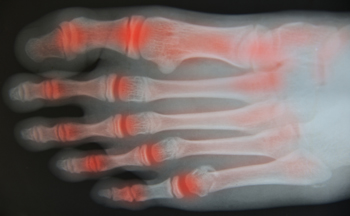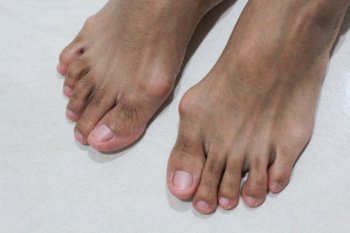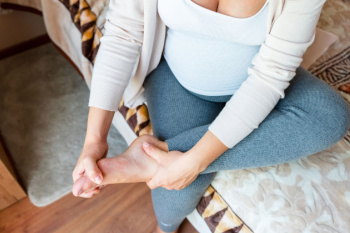Items filtered by date: December 2024
Causes and Relief From Toe Arthritis

Toe arthritis is a condition where the joints in the toes become inflamed, causing pain and stiffness. The most common cause is osteoarthritis, which occurs as the cartilage in the toe joints wears down over time, often due to age or repetitive stress. Other causes include rheumatoid arthritis or injury to the toe. Symptoms of toe arthritis include pain in the affected joint, particularly during movement, swelling, and a reduced range of motion. In some cases, the joint may become deformed or misaligned. Relief from toe arthritis involves wearing proper footwear that provides support and cushioning, as well as anti-inflammatory medications to reduce pain and swelling. Specific exercises can also help improve joint flexibility and strength. In severe cases, surgical options may be considered to restore function and alleviate pain. If you have symptoms of arthritis in your toes, it is suggested that you consult a podiatrist who can offer you effective relief and management tips.
Arthritis can be a difficult condition to live with. If you are seeking treatment, contact one of our podiatrists from BayCity Associates in Podiatry . Our doctors can provide the care you need to keep you pain-free and on your feet.
Arthritic Foot Care
Arthritis is a joint disorder that involves the inflammation of different joints in your body, such as those in your feet. Arthritis is often caused by a degenerative joint disease and causes mild to severe pain in all affected areas. In addition to this, swelling and stiffness in the affected joints can also be a common symptom of arthritis.
In many cases, wearing ill-fitting shoes can worsen the effects and pain of arthritis. Wearing shoes that have a lower heel and extra room can help your feet feel more comfortable. In cases of rheumatoid arthritis, the arch in your foot may become problematic. Buying shoes with proper arch support that contour to your feet can help immensely.
Alleviating Arthritic Pain
- Exercises that stretch the foot can prevent further pain and injury and increase mobility
- Most of the pain can be alleviated with anti-inflammatory drugs, heat, and topical medications
- Massages can help temporarily alleviate pain.
It is best to see your doctor for the treatment that is right for your needs and symptoms. Conditions vary, and a podiatrist can help you determine the right method of care for your feet.
If you have any questions please feel free to contact our offices located in Erie, PA and Meadville, PA . We offer the newest diagnostic tools and technology to treat your foot and ankle needs.
Ankle Fracture? Don’t Wait for Treatment
Surgical Remedies for Bunions

Surgery may be recommended when a bunion causes persistent discomfort or pain that does not improve with conservative treatments. A bunion, or hallux valgus, is a deformity at the base of the big toe, often resulting in a bony bump, irritation, and difficulty wearing shoes. Surgical options focus on realigning the affected joint to improve function and reduce pain. Common bunion surgery procedures include osteotomy, where the bone is cut and repositioned, and arthrodesis, which involves fusing the joint for long-term stability. In some cases, removing part of the bone or soft tissue may also be necessary to restore alignment. The choice of procedure depends on factors like the severity of the bunion and the effect it has on other parts of the foot. A podiatrist can evaluate the situation, explain surgical options, and guide you through the recovery process. If you have a bunion that is causing constant discomfort, it is suggested that you schedule an appointment with a podiatrist to find out if surgery is an option.
Foot surgery is sometimes necessary to treat a foot ailment. To learn more, contact one of our podiatrists of BayCity Associates in Podiatry . Our doctors will assist you with all of your foot and ankle needs.
When Is Surgery Necessary?
Foot and ankle surgery is generally reserved for cases in which less invasive, conservative procedures have failed to alleviate the problem. Some of the cases in which surgery may be necessary include:
- Removing foot deformities like bunions and bone spurs
- Severe arthritis that has caused bone issues
- Cosmetic reconstruction
What Types of Surgery Are There?
The type of surgery you receive will depend on the nature of the problem you have. Some of the possible surgeries include:
- Bunionectomy for painful bunions
- Surgical fusion for realignment of bones
- Neuropathy decompression surgery to treat nerve damage
Benefits of Surgery
Although surgery is usually a last resort, it can provide more complete pain relief compared to non-surgical methods and may allow you to finally resume full activity.
Surgical techniques have also become increasingly sophisticated. Techniques like endoscopic surgery allow for smaller incisions and faster recovery times.
If you have any questions, please feel free to contact our offices located in Erie, PA and Meadville, PA . We offer the newest diagnostic and treatment technologies for all your foot care needs.
How Pregnancy Affects Foot Health and Structure

Pregnancy brings many changes to the body, and the feet are no exception. As the body undergoes hormonal shifts, the ligaments in the feet become looser, which can alter foot structure and cause the arches to flatten. This leads to increased foot length and width, which may require a change in shoe size. Swelling, or edema, is another common issue, as the body retains more fluid during pregnancy, causing the feet and ankles to become swollen, particularly at the end of the day. This can result in discomfort and difficulty walking. Additionally, the extra weight gained during pregnancy places added pressure on the feet, contributing to heel pain and even conditions like plantar fasciitis. If you have foot pain during your pregnancy, it is suggested that you consult a podiatrist who can offer you effective relief and management solutions.
Pregnant women with swollen feet can be treated with a variety of different methods that are readily available. For more information about other cures for swollen feet during pregnancy, consult with one of our podiatrists from BayCity Associates in Podiatry . Our doctors will attend to all of your foot and ankle needs.
What Foot Problems Can Arise During Pregnancy?
One problem that can occur is overpronation, which occurs when the arch of the foot flattens and tends to roll inward. This can cause pain and discomfort in your heels while you’re walking or even just standing up, trying to support your baby.
Another problem is edema, or swelling in the extremities. This often affects the feet during pregnancy but tends to occur in the later stages.
How Can I Keep My Feet Healthy During Pregnancy?
- Wearing orthotics can provide extra support for the feet and help distribute weight evenly
- Minimize the amount of time spent walking barefoot
- Wear shoes with good arch support
- Wear shoes that allow for good circulation to the feet
- Elevate feet if you experience swelling
- Massage your feet
- Get regular, light exercise, such as walking, to promote blood circulation to the feet
If you have any questions, please feel free to contact our offices located in Erie, PA and Meadville, PA . We offer the newest diagnostic and treatment technologies for all your foot care needs.

